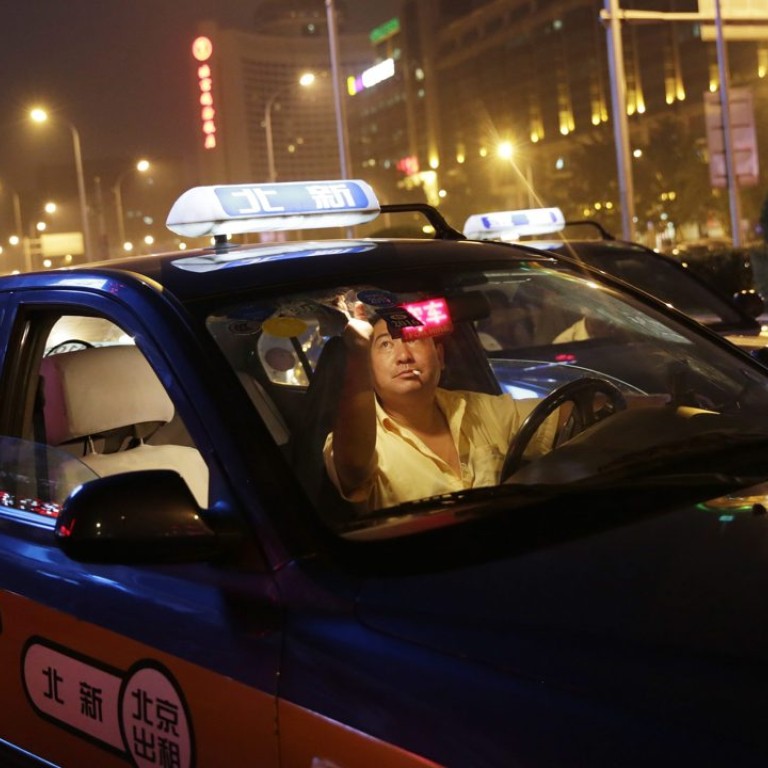
‘Any one of us could be the next victim’: More Chinese drivers ditch car-hailing apps like Uber, Didi Kuaidi as gov’t tightens screws
A large number of drivers in the southern Chinese city of Guangzhou working for popular car-hailing apps like Uber are quitting the business due to declining income levels, regulatory scrutiny and heavy fines, drivers have told the South China Morning Post.
A private car driver working for China’s market-leading car-hailing app Didi Kuaidi told the Post he had been handed a fine of 100,000 yuan (US$15,733) on Wednesday for engaging in illegal transport activities and reaping illicit profits. He was notified of the fine last month.
This stands as the largest-known fine levied against drivers in the country working for such apps, which have struggled all year with a backlash from established taxi industry players. This led to government crackdowns, raids and police stings across the country and in Hong Kong.
Cui Gaohui, the driver in Guangzhou, said he was caught by undercover police on June 9 when carrying a passenger and using the company’s Didi Zhuanche private car-hailing app.
He said he was notified of the punishment by local transport authorities in early September.
“I had to pay it because I don’t have any power to fight the authorities. I’m a nobody,” said Cai.
“I have no idea whether the record will affect my life in the future. Will I have a problem applying for a bank account, a job or a visa to go abroad?”
“I’m extremely scared and angry but I can’t find a way around this,” he said.

“I started working for this app early this year out of curiosity. I’m just a young middle-class Chinese man who is interested in these kind of internet-enabled innovations,” he added.
“But now I’ve become a real victim of the crackdown by the authorities and vested interest groups as the taxi industry goes through this period of reform and innovation.”
Without going into detail, Cai said that Didi Kuaidi had provided assistance with the matter, but that he feared repercussions in terms of future employment and other matters.
Many Chinese drivers working for rival app Uber, which is based in San Francisco, have formed networking - or perhaps “support” - groups on WeChat, the predominant mobile messaging app in mainland China run by gaming and social giant Tencent.
Such mobile chat groups in Guangzhou typically feature 300 to 500 people. This week, many were filled with drivers registering indignation after hearing Cai’s story.
“Any one of us could be the next victim,” said Jay Li, another driver in the city who works for the same app.
“In the WeChat groups, a lot of drivers have said they will quit soon,” he added.
“It’s becoming more and more risky work to work for Uber and Didi, especially after the introduction of new rules to increase oversight of internet-based car-booking firms.”

On Sunday, the central government released a set of draft regulations to put Uber and its rivals under multi-regulatory scrutiny. The new rules effectively apply taxi industry standards to this spin-off business.
The Ministry of Transport said online car-booking companies must be fully licensed, have their prices guided by the government or decided by market competition, and set up their servers on the Chinese mainland.
In addition, foreign-invested operators must pass a set of tests designed to ensure national security .
They also need to get Chinese telecommunications licences if they offer value-added business in this field.
The proposal requires drivers working for such apps to register their vehicles for use as taxis. Once this is done, they can use their vehicles for a maximum period of eight years of service.
“If the regulations are put into operation, car-hailing apps would have no competitive advantage in terms of price. We estimate that our income would drop dramatically.” Li said.
According to the Guangzhou-based New Express newspaper, a company that purchased 200 Toyota Camrys early this year to lease them to drivers working for car-hailing apps had to shut down last week.

It was forced to do this after most of the drivers returned the cars and quit the business, the paper reported.
Both Didi Kuaidi and Uber have kept a low profile in response to recently proposed guidelines.
However, just last week they announced their respective plans to expand in China.
Didi Kuaidi, which is backed by Chinese internet giants Tencent and Alibaba, said in Shanghai it had received China’s first internet car-booking licence from the Shanghai Municipal Transportation Commission (SMTC).
This means the company has become the first legally authorised operator of an online private car booking platform in China.
Uber also said it has set up a company in the China (Shanghai) Pilot Free Trade Zone - which is being used to experiment with economic and other reforms - called Wubo Information Technology. Wubo sounds like the Chinese pronunciation of Uber.
Uber’s vice president of finance Axel Martinez will be its legal representative in Shanghai. The company was established to make Uber’s services more localised, a spokesperson said.

